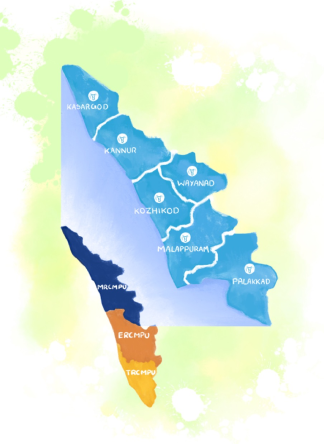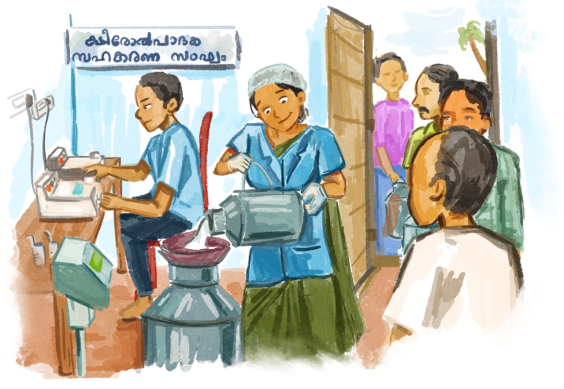

In Kerala, Milma is the renowned Brand name of dairy farmer's initiative in the co-operative sector. In order to ensure the quality of milk from the initial stage of procurement, MILMA has set up village level bulk milk coolers with the help of financial aid from the Central Government which helps in improving the quality of the milk. Bulk Milk Coolers are established at societies for chilling milk to maintain the bacterial quality by arresting the bacterial growth at lowered temperatures. After chilling milk is brought to the dairy plants in insulated tankers and is subjected to various quality tests including platform tests, chemical and microbiological tests before processing. Once the milk procured from the farmers passes all these quality tests, it is subjected to various processes such as Pasteurization, Homogenization, Product Diversification, etc. After conforming to all quality checks, Milk and Milk Products with assured quality are being delivered to the consumers. Milma's development model comprises strategic planning for the storage-processing-marketing investments required for the dairy industry with proper long-term vision by acquiring the necessary funds from its own business profits, Central Government, State Government and also benefactors like the Swiss Development Agency. MILMA is able to return 84 percent of the revenue generated from the consumers to the farmers as basic milk price and profit margin for the upliftment and welfare of the dairy farmers. Milma is being functioned through transparency, honesty and professionalism.

Dairy sector is the backbone of the agriculture sector. For the last two decades, India has become number one in milk production among all the countries in the world. Also, Kerala has been able to achieve remarkable growth in the Dairy Sector due to the joint efforts of the State Government and Milma by maintaining stable milk price in the market. Milma utilize ingenious innovations in the field of milk procurement, processing & marketing and also promotes many farmer welfare activities.

Milma is committed to provide the best milk price with utmost accuracy to the farmers in the dairy sector which plays a pivotal role in the agriculture sector. The operational profits of the Malabar union are channeled back to the farmers themselves through various farmer welfare activities, farmer support programs and incentives.
Unlike other institutions, the administration of the Regional Unions and KCMMF is a board of direction elected only by the farmers among themselves through voting rights. Hence, the Board of Direction is able to make better decisions for the welfare of the dairy farmers with a long term vision for the betterment of dairy farmers. Operational profits are paid to all milk supplying farmers in the Dairy Co-operative Societies registered with MILMA.
In 1990 Malabar Regional Union started functioning with around 144 Dairy co-operative societies only as members whereas in 2022 it increased to 1140 Primary Dairy Cooperative Societies.
Although there are more than three lakh dairy farmers as members, currently less than one lakh farmers are providing milk on a daily basis. On an average, 7.5 lakh litres of milk is being procured on a daily basis by the Malabar Regional Union.
The Malabar Regional Milk Union has technically equipped and empowered its dairy farmers who are the members of the dairy cooperative societies with required knowledge and infrastructure for chilling the milk in order to ensure its quality before procurement by Milma.
Milma is procuring milk on a daily basis in all days despite of hartal, strike & natural calamities/pandemics, etc and effecting the milk value payment in every ten days as per the pre-fixed price chart.

In Kerala, the Indo-Swiss collaboration started in 1962. This project took off in its full swing in early 1963 and is still considered as an example of unparalleled and astounding bilateral cooperation in the history of the Indian Dairy Sector. The Indo-Swiss Project, Kerala, was funded by the Swiss Agency for Development and Cooperation (SDC) till 1996. The success of the cross-breeding programme has taken Animal Husbandry and Dairying in Kerala to new heights resulting in multifold increase in the productivity of milch animals. Thus, dairying as an occupation has exclusively carved an enviable niche in the rural economy. It has grown as a sector capable of providing sustainable income to the rural poor. The state of Kerala still cherishes the indelible imprints of this Swiss legacy with gratitude.
Similarly, the North Kerala Dairy Project was the result of an agreement between “The Swiss Federal Council (Swiss Government)” and the “Government of the Republic of India” on 25.09.1987. Malabar Regional Cooperative Milk Producers’ Union, Popularly known as Malabar Milma, was born as a baby out of Swiss funding in 1989. The funding was mainly to enhance procurement of milk from farmers, developing processing infrastructures, developing information technology networks etc. Since its inception, the Union has been nurtured strategically and financially under Swiss aegis till 2002. Later, the Malabar Milk Union, which spans six districts of northern Kerala, flung into new heights as a self-reliant organization.

The Union has become the largest Dairy Cooperative in Kerala in terms of farmer members, primary dairy cooperatives, milk procurement, sales of quality products and turnover. Today Malabar Milma stands apart in the Indian Dairy scenario as the most farmer-friendly Milk Union with excellent governance.

A crucial time in migrant farming history. Amidst the Wagamon farmers who lived in the mountains battling with unfavorable conditions, Fr. Francis, the Belgian Missionary, arrived in 1960. Having an understanding about dairy farming, he realized the potential of dairy-based mixed farming in the Peerumedu high ranges. He envisioned a milk shed, a new farming region for the farmers in the vast Peerumedu meadows. He shared this concept with Mr. Jacques A. Cutat, his friend and Switzerland ambassador to India, which became a turning point. The Switzerland teams who visited the Kerala high ranges as a part of the dairy colonization recommended an experimental project on the deserted Government-owned 500 acres of land at Mattupetty. Soon, both the governments decided to establish the Indo-Swiss project in Kerala which breathed new life into the dairy farmers’ lives and the dairy sector in Kerala.
The Indo Swiss Project, jointly signed by the Indian and Switzerland Governments in mid 1960’s aimed at breeding a new cattle species, and made revolutionary changes in the lives of Kerala dairy farmers through artificial insemination, better cattle health management, grassland development, etc. This project, funded by SDC, Swiss Agency for Development and Co-operation till 1996, played a significant role in ensuring fixed income for the underprivileged farmers.


The North Kerala Dairy Project is an agreement signed between the Government of India and the Swiss Government on 25th September 1987 for nourishing Dairy Development activities in the Malabar region. The project had 2 phases and one extended phase with a total outlay of Rs 26.02 crore, out of which Rs 16.18 crore received as grant and Rs 9.84 crore as loan. Malabar Milma was formed in the first phase of this project, which was the cornerstone of Dairy Development in Malabar.
Malabar Milma, known as the Malabar Regional Co-operative Milk Producers' Union formed in 1989 as a part of the North Kerala Dairy Project, is a reminder of the Swiss tradition and the financial aid provided by SDC.
Until 2002, Malabar Regional Co-operative Milk Producers’ Union, which was financially and organizationally supported by SDC, has then grown to become one of the largest organization of dairy farmers, milk societies, milk production and collection factories and revenue sectoral unions. The beginning of this victory journey of Malabar Milma, which later spread to 6 districts as an example of excellent dairy farmer friendship in the state, was full of adversities.


The Malabar Regional Co-operative Union faced many adversities such as Malappuram, Wayanad, and Kozhikode District Milk Unions refusing to involve, the opposition of the traditional societies against the Anand model, the lack of processing amenities, shortage of milk, milk spoilage, ghee being the only product, and the lack of support from the operation flood. Today, every step that Malabar Milma took to overcome each hurdle and transform them into power, is history.
Malabar Milma is a continuation of the brilliance envisaged in procuring every drop of milk produced by the farmers without compromising the quality. Milma is an organization leading from the forefront with a vision as a result of hard work contributing towards the betterment of farmers through welfare activities.
Milma pays about 83% of the revenue obtained from the marketing of milk and milk products back to the farmers, including the additional milk price. Milma pays a certain amount of money from each litre of milk directly to the Government’s pension scheme for dairy farmers. Milk solids content and other allied important information are instantly made available to the farmers through the automated milk collection units installed in the societies. So far, about 24,000 calves have been adopted and those who opt for the ‘Heifer Development Program’ are given free insurance for 3 years and the price of the feed shall be reduced to 50 % for a period of 20 months. Apart from this the following input activities are provided by Malabar Union:

Malabar Milk Union is having a 1) UHT Milk Plant worth Rs 13 crore which has been imported from Italy at Malayora Dairy, Sreekandapuram, Kannur 2) A fully automated ice cream plant at Kozhikode Dairy 3) Peda Packing Machine, Condensed Milk Plant and Butter Making machines at Wayanad dairy, and to coordinate of all these activities and for easy communication, around 54 cloud-based internal softwares are working efficiently in Malabar Union. Milma Shoppees, Milma shop at Defense Camp, Milma shops at hospitals, Milma shop at Naduvattam Kozhikode, Milma Shoppee at supermarket at Wayanad, Milma shops in malls, export of different products to Gulf region, flight catering, online marketing, marketing plans in collaboration with KSRTC and KTDC, Marketing through Swiggy, apart from all of this, around 61 women village level workers with vehicle and freezer delivers Milma products to the remote and rural areas consists of the production and distribution chain.
Malabar Milma is an organisation that provides India's highest milk price to the farmers while staying abreast of technology and innovating day by day and directly or indirectly providing livelihood opportunities to more than one lakh people.
Malabar Milma has been fulfilling the ultimate goal of the North Kerala Dairy Project to improve the standard of living of the dairy farmer and today stands out to be a unique model in the dairy cooperative sector. Malabar Milma, which has become Malayalee's favourite choice with its vivid products, embraces the concept of farmers’ prosperity through consumer satisfaction and continues its successful saga through generations.
| Date of Registration | 29/06/1989 |
| Date of starting operation | 15/01/1990 |
| No. of Dairy Plants | 5 |
| Central Products Dairy | 1 |
| No. of Raw Milk Reloading Centre | 4 |
| No. of Procurement and Input Centres | 10 |
| No. of Marketing Depots | 7 |
| No. of Human Resource Development Centre | 1 |
| Average daily procurement of raw milk (2022-2023) | 6,90,127 Litres |
| No. of farmers supplying milk to the Union (2022-2023) | 86,780 |
| Per day processing capacity (2022-23) | 10 lakhs |
| Per day rural milk chilling capacity (2022-23) | 8.7 Lakhs |